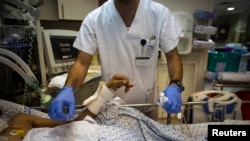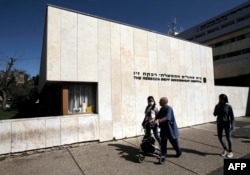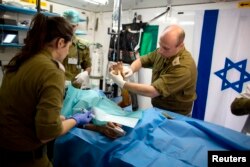Less than an hour after a car bomb exploded wounding his leg in the Syrian province of Quneitra, Dr. Abu Hamzeh was in Israel.
The Israelis opened a passage at the border and took him to a hospital in Safad. There, he, a surgeon-turned-patient, found himself in pajamas with Hebrew letters and an Israeli doctor tickling his foot and asking, "You feel?"
Abu Hamzeh is not his real name. Journalists were allowed to see wounded Syrians on condition they do not publish their names or pictures that could put them at risk when they go home. So the 35-year-old doctor gave one name, changed his mind and gave another, which means Hamzeh's father.
Abu Hamzeh is a Sunni-Muslim and a rebel. In the bed next to him was a farmer, Fares, 24, a Shiite-Muslim who was wounded when he accidentally stepped on a bomb near Damascus. The Shi'ites support President Bashar Assad, but Fares said he did not belong to any militia.
Medical aid across the border
The medical treatment given them and more than 2,100 other Syrians in recent years is one of the reasons why Israel's border with Syria became so quiet.
" For months there has been no cross-border fire," the Israel Defense Forces Deputy Chief of General Staff Major General Yair Golan told VOA.
The border is 100 kilometers-long. The Syrian army, backed by Hezbollah, which Western countries and the Arab League consider a terrorist organization, is in the north. Jabhat al-Nusra, affiliated with al-Qaida, controls the central sector and Shuhadat al-Yarmukh, which declared allegiance to the Islamic State, is in south. They say they want to destroy Israel.
But the people who live in those areas are primarily concerned with local issues, Professor Eyal Zisser, Tel Aviv University's vice rector and an expert on Syria, says.
They are "deeply conservative, but religion has been imbued with a local tradition of moderation," wrote Khaled Yacoub Oweis in a paper
published by the German Institute for International and Security Affairs.
Defense Minister Moshe Ya'alon's condition for aid, that the Syrians "not allow any terror ...to approach our border and operate against us," is one that even radical militia leaders can accept. Their immediate aim is to get rid of the Assad regime and establish a caliphate.
Humanitarian aid
Liquidating Israel is a future goal, the Institute for Strategic Studies in Tel Aviv noted in a recent publication. All the players in southern Syria, even violent Jihadist forces that do not consider Israel an imminent enemy, can acquiesce to ad hoc activities to meet security, civilian or humanitarian needs, the statement said.
The arrangements on the Golan were made through intermediaries. "We [only] talk to Syrian elements across the border who are moderate," Major General Yair Golan said.
The Free Syrian Army appears to be such a group.It is a fairly moderate, secular, U.S.-backed organization.
Some people get to the border on their own, Major General Golan said.They include pregnant women and children who are sometimes
accompanied by a parent or a grandparent. But 70 to 80 percent of the arrivals are orthopedic cases.
Saving lives, helping wounded
Israel treats them regardless of their organizational affiliation. "We don't screen people in need," Israeli spokesman Lieutenant Colonel Peter Lerner said.
Israeli soldiers in full battle gear meet the Syrians at the border. Medics undress them, check their wounds and after initial treatment cover them with a sheet or a blanket and send them to a hospital.
The wounds are sometimes gory. Professor Alexander Lerner, who heads Ziv Hospital's Orthopedic Department, said doctors sometimes amputate a leg above the injury, remove the devastated part and join the section that can be saved. Then they stretch the leg by two millimeters a day.
Most of the patients "go home walking," he said. Israel also provides villagers with food, fuel, and blankets.
Meanwhile, it erected a formidable border fence topped with rows of coiled barbed wire. It set up cameras and radar. A new division was built with rapid response teams and a hotline to the air force that can intervene swiftly.
The army's main concern is to prevent "a sudden storming of the border," Lieutenant Colonel Lerner said. Some Syrians tried to persuade Israel to deepen its involvement, but General Golan was emphatic. "It would be a grave mistake to intervene … to help this one or that one," he asserted.
The regime and the Jihadist organizations are Israel's bitter enemies. The Institute for Strategic Studies' publication noted that Israel doubts the new Syrian players would be reliable partners and the lessons from its involvement in Lebanon still hurt. What began with a Good Fence policy in Lebanon ended with painful Hezbollah attacks and an unconditional withdrawal to the international border.







